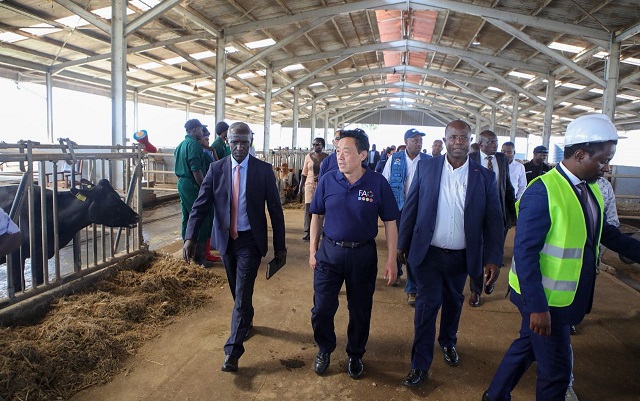
Kampala, Uganda | Patricia Akankwatsa | The National Livestock Resources Research Institute (NaLIRRI) on Tuesday hosted Dr. Qu Dongyu, Director-General of the Food and Agriculture Organization (FAO), for a significant visit focused on stengthening Uganda’s agricultural sector. The visit highlighted the long- standing, harmonious cooperation between FAO and the Government of Uganda, with particular emphasis on transforming research into tangible, marketable products.
Hon. Fred Bwino Kyakulaga, addressing the gathering, extended a warm welcome to Dr. Dongyu, acknowledging the previous day’s reception by President Museveni. He expressed profound gratitude for FAO’s consistent support to Uganda, noting, “At every stage we were stopping and informing you that this is being supported by FAO… almost during the entire tour. So, I want to, on behalf of the Government of Uganda, thank you and thank FAO for that support.”
Minister Kyakulaga further commended the strong partnership between FAO and Uganda. “We in government don’t take for granted the kind of harmony that exists in the cooperation between FAO and the Government of Uganda.”
He specifically lauded the outgoing FAO representative to Uganda, Dr. Antonio, for his close collaboration, and extended a warm welcome to the new representative, Mr. Beraki, assuring hi of continued cooperation. He emphasized the government’s active role in shaping FAO’s programming, ensuring it aligns with Uganda’s national development plans, including the newly launched National Development Plan.
Highlighting the innovative spirit of Dr. Dongyu’s leadership at FAO, Minister Kyakulaga praised initiatives that have diversified FAO’s funding, moving away from traditional sources. He singled out the “Hand-in-Hand Investment Initiative” as particularly impactful for Uganda.
“We are grateful that through that initiative, you are helping us to find investors that can transform our research prototypes into commercial products, most especially in the areas of maize, dairy, animal feed, vaccine, meat, skin and others.”
The Minister also lauded FAO’s “One Country, One Product Initiative,” through which Uganda has selected cocoa as its priority product. He recounted the intense competition between sweet potato and cocoa, noting that while Uganda was historically the second-largest producer of sweet potato globally, “all the same, we are contented that cocoa was selected.”
In a direct appeal for enhanced collaboration, Minister Kyakulaga outlined key areas for future partnership. Foremost among these was vaccine development and pharmaceuticals, echoing President Museveni’s emphasis.
“We have an ambitious plan of developing a vaccine and pharmaceutical city right across there. And we have put aside acres for that purpose. And we request you to collaborate with us in first of all, developing that dream, but also working towards making it and transforming it into a reality,” he stated. Mechanization was also highlighted as another crucial area for FAO’s support.
In response, Dr. Qu Dongyu expressed his delight at the visit and pledged tangible assistance.
“I’m willing to offer a little bit humble assistance to you,” he stated, announcing a special Technology Cooperation Program (TCP) project to boost Uganda’s technical capacity. He encouraged Uganda to leverage FAO’s global platforms, such as the World Food Forum, to attract partners, investors, and scientists.
“I offer a platform for you to play. If you want to become a famous actress, you have to play. I’m only an organizer or conductor or conducting chief,” he said, emphasizing the unparalleled networking opportunities FAO provides.
He stressed that food security is a collective responsibility, not solely confined to the Ministry of Agriculture, urging Uganda to develop “your own national ideas. Political ideas, economic ideas, scientific ideas. That’s a real idea. It’s not a wine idea. Drink and eat and enjoy. No, it’s a business idea.”

Dr. Qu also laid out his “Four Betters” philosophy for agricultural food system transformation: better production, better nutrition, a better environment, and a better life.
He challenged scientists to go beyond academic papers and focus on “how to transform your technology to the farmers to make money.”
He articulated that the true measure of scientific work lies in its ability to “make local economy develop better. Make the other people’s life better.”
He urged NaLIRRI to embody this philosophy, offering solutions for “better production,” “better nutrition,” and a “better environment,” moving beyond simple biodiversity conservation to transforming it into “food diversity” for improved nutrition and overall quality of life.
Dr. Yona Baguma, Director General of NARO, reiterated the institute’s pride in developing technologies that have contributed to food, nutrition, economic, and environmental security. He acknowledged FAO’s significant support, including a substantial contribution in the year for cassava seed systems development.
Dr. Baguma outlined specific areas where NARO seeks further FAO collaboration: advancing the horticulture and spice industries, enhancing crop productivity, developing nutrient-dense crop varieties, strengthening soil sciences, advancing food sciences, connecting NARO to global informatics for scientific advancement, and supporting data analytics for the betterment of mankind.
The visit concluded with a strong commitment from both sides to deepen their partnership, harnessing scientific innovation and strategic investments to drive Uganda’s agricultural transformation and achieve lasting prosperity.
 The Independent Uganda: You get the Truth we Pay the Price
The Independent Uganda: You get the Truth we Pay the Price



